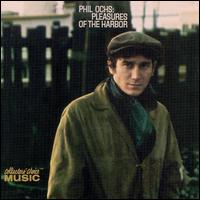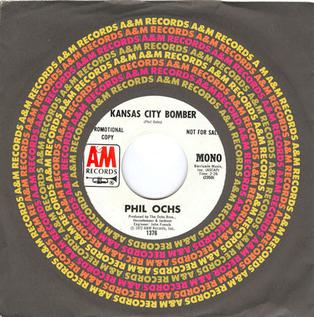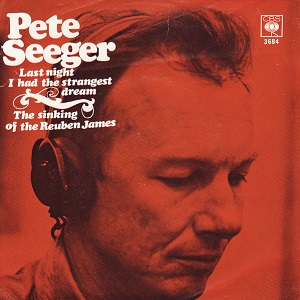Related Research Articles

Philip David Ochs was an American songwriter and protest singer. Ochs was known for his sharp wit, sardonic humor, political activism, often alliterative lyrics, and distinctive voice. He wrote hundreds of songs in the 1960s and 1970s and released eight albums.

Judith Marjorie Collins is an American singer-songwriter and musician with a career spanning seven decades. She is known for her eclectic tastes in the material she records, for her social activism, and for the clarity of her voice. Collins is a Grammy Award-winning artist who has released 28 studio albums, four live albums, numerous compilation albums, and four holiday albums.

Pleasures of the Harbor is Phil Ochs' fourth full-length album and his first for A&M Records, released in 1967. It is one of Ochs's most somber albums. In stark contrast to his three albums for Elektra Records which had all been folk music, Pleasures of the Harbor featured traces of classical, rock and roll, Dixieland jazz and experimental synthesized music crossing with folk, in hopes of producing a "folk-pop" crossover.

Cross My Heart: An Introduction to Phil Ochs is a British best-of compilation of the U.S. folk singer's A&M recordings. The CD features three tracks each from Pleasures of the Harbor, Tape from California, and Rehearsals for Retirement as well as two from Greatest Hits and one from Gunfight at Carnegie Hall, with the thirteenth track the B-side to his 1973 Africa-only single, "Niko Mchumba Ngobe". Overall, this is a more diverse collection than 2002's 20th Century Masters: The Millennium Collection: The Best of Phil Ochs, which tips the balance more heavily toward Pleasures of the Harbor.

Live at Newport is a 1996 compilation on Vanguard Records of folk singer Phil Ochs' three appearances at the Newport Folk Festival, in 1963, 1964 and 1966. Presenting twelve tracks that also appear on his first, second, third, fourth and fifth albums, Ochs is at his peak as a folk singer throughout, singing anti-war songs alongside those espousing civil rights and worker's rights, and showcasing some more introspective numbers that would be dramatically rearranged on the fourth and fifth albums.

The War Is Over: The Best of Phil Ochs is a 1988 compilation album of Phil Ochs' works on A&M Records recorded between 1967 and 1970. With varying amounts of tracks from the albums, between two and five, from each album except Gunfight At Carnegie Hall, it paints a portrait of Ochs' later works that does not emphasize his folk songs, instead presenting the more introspective and/or experimental tracks. It did feature a live version of "I Ain't Marching Anymore" later reissued as a part of the 1991 album that presented the entire concert from which it was culled, There And Now: Live in Vancouver 1968.

American Troubadour is a 1997 British 2-CD set that presented a portrait of singer-songwriter Phil Ochs' later career, featuring selections from each of the five albums he recorded for A&M Records, from various non-album single sides and from a performance Ochs gave on March 13, 1969, in Vancouver, British Columbia. It is notable for the inclusion of Ochs' post-1970 single sides, otherwise unavailable on compact disc and for the inclusion of a cover of Chuck Berry's "School Days", a previously unavailable outtake from Ochs' infamous March 27, 1970, concert at Carnegie Hall.

Farewells & Fantasies is the 1997 posthumous box set of the work of singer/songwriter Phil Ochs, chronicling his life and career in music from 1964 through 1970. With its non-chronological running order, it plays like three separate albums, each showcasing a different side of Ochs. The compilation was produced by Gary Stewart, Michael Ochs and Meegan Lee Ochs. Liner notes include a foreword by Meegan Lee Ochs, "The Sound of Freedom Callin'" by Michael Ventura and "Song of a Soldier: The Life and Times of Phil Ochs" by Mark Kemp, track-by-track explanations by Ben Edmonds, discography, selected bibliography, and many photographs, some of which are from the family's private collections. The box set is dedicated to a friend, co-writer, and inspiration to Phil Ochs, Bob Gibson, who died while the box set was in production. Its title comes from the back of Ochs' LP Tape from California.

The American folk music revival began during the 1940s and peaked in popularity in the mid-1960s. Its roots went earlier, and performers like Josh White, Burl Ives, Woody Guthrie, Lead Belly, Big Bill Broonzy, Billie Holiday, Richard Dyer-Bennet, Oscar Brand, Jean Ritchie, John Jacob Niles, Susan Reed, Paul Robeson, Bessie Smith, Ma Rainey and Cisco Houston had enjoyed a limited general popularity in the 1930s and 1940s. The revival brought forward styles of American folk music that had in earlier times contributed to the development of country and western, blues, jazz, and rock and roll music.
"Outside of a Small Circle of Friends" is a song by Phil Ochs, a U.S. protest singer from the 1960s. "Outside of a Small Circle of Friends", which was originally released on Ochs' 1967 album Pleasures of the Harbor, became one of Ochs' most popular songs.
Jim and Jean, composed of Jim Glover and Jean Ray (1941–2007) were an American folk music duo, who performed and recorded music from the early to the late 1960s.
Jim R. Glover is an American peace activist and folk singer. He is from Cleveland, Ohio and lives in Brandon, Florida.

"Bwatue" is a song by Phil Ochs, a US singer-songwriter best known for the protest songs he wrote in the 1960s. He co-wrote the song with two African musicians named Dijiba and Bukasa. "Bwatue" was written and recorded in 1973.
"There but for Fortune" is a song by American folk musician Phil Ochs. Ochs wrote the song in 1963 and recorded it twice, for New Folks Volume 2 and Phil Ochs in Concert. Joan Baez also recorded "There but for Fortune" in 1964, and her version of the song became a chart hit.

The discography of Phil Ochs, a U.S. protest singer and songwriter, consists of seven studio albums, six live albums, six compilation albums, one box set, six other albums, and nine singles.
"Crucifixion" is a 1966 song by Phil Ochs, a US singer-songwriter. Ochs described the song as "the greatest song I've ever written".

"Kansas City Bomber" is a song by Phil Ochs, a US singer-songwriter best known for the protest songs he wrote in the 1960s.

"Last Night I Had the Strangest Dream" is a song written by American Folk Singer-songwriter Ed McCurdy in 1950. Due to McCurdy's connection with fellow musicians, it was common in repertoires within the folk music community. The song had its first album release when Pete Seeger recorded it as "Strangest Dream" for his 1956 album Love Songs For Friends & Foes. Seeger would later re-visit the song for his 1967 album Waist Deep in the Big Muddy and other Love Songs. The strong anti-war theme of the song led it to be recorded by multiple other artists, including The Weavers (1960), Joan Baez (1962), The Kingston Trio (1963), Simon & Garfunkel (1964), and Johnny Cash who released two versions of the song during the 2000s.
References
- ↑ Brend, Mark (2001). American Troubadours: Groundbreaking Singer-Songwriters of the 60s . San Francisco: Backbeat Books. p. 106. ISBN 0-87930-641-6.
- 1 2 Schumacher, Michael (1996). There But for Fortune: The Life of Phil Ochs . New York: Hyperion. p. 154. ISBN 0-7868-6084-7.
- 1 2 Eliot, Marc (1989) [1979]. Death of a Rebel: A Biography of Phil Ochs. New York: Franklin Watts. p. 132. ISBN 0-531-15111-5.
- ↑ "Chart Spotlights". Billboard . October 28, 1967. p. 10. Retrieved August 2, 2010.
- ↑ "CashBox Record Reviews" (PDF). Cash Box. October 21, 1967. p. 46. Retrieved January 12, 2022.
- ↑ Eliot, p. 138.
- ↑ Cohen, David (1999). Phil Ochs: A Bio-Bibliography. Westport, Conn.: Greenwood Press. pp. 200–201. ISBN 0-313-31029-7.
- ↑ Cohen, pp. 202–205.
- ↑ Cohen, pp. 276, 282.